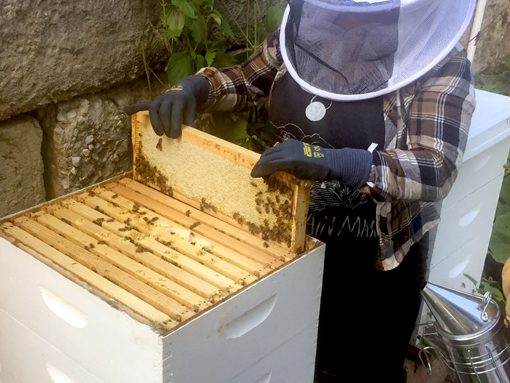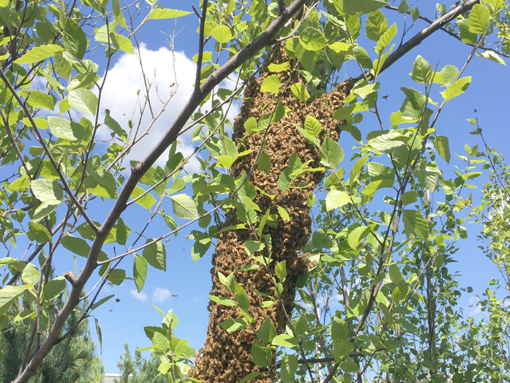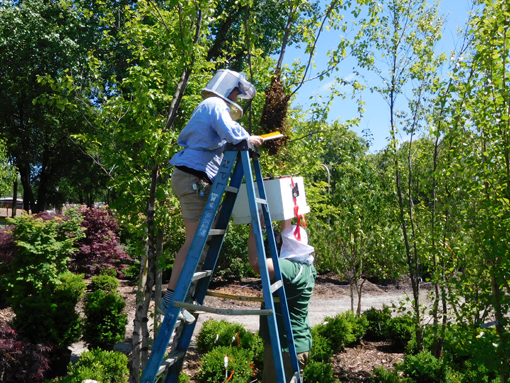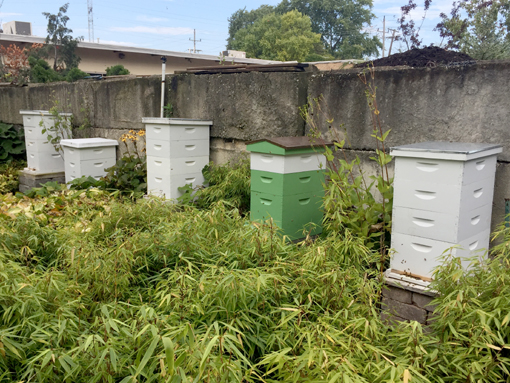After the devastating loss of our first beehive at the end of 2016, we decided to double down and establish two hives on our property at 2000 Greenleaf Street. Last year, the city of Evanston passed an ordinance requiring anyone intending to keep bees to get written approval from any adjacent property owner. Luckily, the form is easy to obtain online, and Nature’s Perspective only has one adjacent neighbor, who was happy to sign off. We also went through the required annual process of applying for a beekeeping license through the city of Evanston website. The Evanston City Code includes general guidelines that every beekeeper should address before applying for their license, such as having a fenced property, signage to make visitors aware of your beehives and a water source, to name a few. We also registered our hives with the State of Illinois.
We bought our bees from Dadant in Watertown, Wisconsin for the second year in a row. Dadant sells any beekeeping supply you can think of and has extremely knowledgeable staff who are always willing to help a new beekeeper get their first hive established. We ordered our bees in February and picked up the bees on May 6, a notably cool, windy day. We purchased two nucs, or nucleus hives. Nucs are essentially mini hives that have a queen and brood already established and developing in the hive. You simply replace five frames from your hive with the five frames from the nuc. This is a little easier for the first-time beekeeper.
Our bees were very happy with their new home and started to expand their colonies very quickly. Almost a month later on June 1, we noticed what looked like a bee tornado during the noon hour. Our bees had swarmed! Many people attach a negative connotation to the phrase “swarm of bees” which is extremely misguided and inaccurate. A swarm occurs for one of two reasons. One reason is because of lack of space. If a queen feels that the colony needs more space, she’ll create new queens and leave the hive, taking about 60% of the existing hive with her. Once the first queen hatches, the other new queens are eliminated in order to only have one new queen. The other reason hives swarm is to simply reproduce. Bees are like every other organism and live to reproduce and further their species. During the swarm, bees are extremely docile as they have no home to protect. Once the queen has landed, the 60% of the hive that left with her clusters around her while scout bees search for a new home. This is when we moved in to capture the swarm.
The colony had swarmed into a nearby river birch. With one brisk shake, the cluster surrounding the queen fell into the hive held below the swarm. More bees were transferred to the new hive and the cover was eventually reinstalled. After several hours, any remaining bees followed the scent of the queen’s pheremones to the new hive and got back to work. We now had three hives! Throughout the summer this process happened two more times, resulting in a total of five beehives in our nursery.
We’ve learned a lot this year from our mistakes of the past. We relocated our hives to a new part of our nursery that still faced south, but got a little more shade during the day. The bees seemed to like this more than the previous location that offered no shade. We also were sure to set up around a dozen yellowjacket traps and reduce the size of our entrances to the hives earlier this year. This prevented, or restricted, access for the carnivorous yellowjackets to decimate our hives, as they did last year. We definitely saw yellowjackets fighting and killing our bees, but with a more manageable size opening, the hives were able to patrol the entrances with ease, resulting in less fatalities.
The most exciting part of our honeybee journey this year was the harvesting of honey! Last year, our hive had been cleaned out by yellowjackets and robber bees, leaving us with no honey. Last week, we harvested our first super (a box in which 8–10 nuc frames are hung), full of honey. The process is about as sticky and messy as anyone can imagine, but it is all worth it in the end when we tasted our freshly harvested honey for the first time!
If you have any beekeeping questions or are interested in setting up your own hive, Nature’s Perspective is happy to answer any questions. We are still learning ourselves, but we are happy to learn together.






